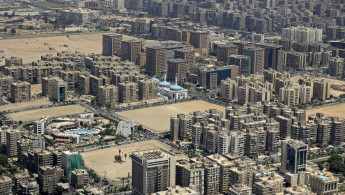A million apartments to boost Sisi's popularity
New recordings leaked from the office of General Abbas Kamel, manager of Egyptian President Abdel Fattah al-Sisi's office, focus on a one million-unit housing project worth nearly $40 billion.
The tapes, aired by the Turkey-based Egyptian satellite channel Mekameleen on Monday, also tackled Emirati aid [Ar] to Egypt since the military coup in July 2013.
| The new leak focuses on massive investments the UAE is supposed to make in sectors that are a burden to any Egyptian regime. |
Activists have linked UAE aid to Egypt to a 2012 leaked video of Muslim Brotherhood member Essam al-Erian, when he was head of Egypt's foreign relations committee.
In the video, Erian asks Egyptian politician Amr Moussa, the former Arab League chief, to mediate with the UAE over the wealth of ousted President Hosni Mubarak, which Erian says was smuggled to the National Bank of Abu Dhabi.
The latest leak does not mention direct aid from the UAE [Ar], but focuses instead on massive investments Abu Dhabi is supposed to be making in sectors that are a burden to the Egyptian regime.
UAE funding
In the new recordings, Kamel informs Sisi, then defence minister and armed forces chief, that the UAE's building project would be spun to make the army - and Sisi in particular - look good.
"Hassan Ismaik [the CEO of UAE-based construction company Arabtec] wants to announce the several-million housing unit project before you run for president," General Kamel is heard telling Sisi.
"So it appears as if the contract was signed with the armed forces, who in turn would look like they were solving the housing crisis."
Arabtec's project has faced many obstacles since it was announced in March 2014. Its frequent delays have led to many Egyptians doubting its completion.
On 4 March 2015, Arabtec shares dropped to their lowest level in five weeks. This followed reports it was halting construction in Egypt, and after talks between its CEO and Egyptian officials to resume work.
According to the Turkish Anadolu news agency, Arabtec shares dropped 1.36 percent by 7am, reaching 2.91 dirhams, the lowest level since January.
In the recording, Sisi is heard demanding that Ismaik travel to Cairo to announce the project [Ar]. However, it turns out Egypt had not even decided where the project was supposed to be built.
Lack of planning
| The UAE decided to start the project in 2014 so it would benefit from the political and financial support it gave Egypt after the 3 July 2013 coup. |
In the leak, Sisi tells Kamel he had spoken to General Mohmed Amin, head of the army's department of financial affairs, and asked him where the housing units would be built.
Amin reportedly suggested several sites, including east Cairo, near Madinati residential city, Badr city on the Cairo-Suez road, and Burj al-Arab in Alexandria.
Sources said that the UAE had been planning the project in Egypt since Mubarak's era to help manage the country's housing shortage [Ar].
The UAE decided to start the project in 2014 so it would benefit from a positive atmosphere due to the political and financial support it gave Egypt after the 3 July 2013 coup.
However, because Egyptian officials had failed to properly plan for the project, and because of financial losses suffered by Arabtec in the second half of 2014, doubts have been raised about Abu Dhabi's ability to complete the project.
Campaigns against the company intensified after it failed to start the project on schedule last September.
Sultan al-Jaber, minister of state for the Emirates - who was mentioned in the leaks as the coordinator of UAE investment in Egypt - said in January Arabtec and the Egyptian armed forces would begin executing phase one of the project in February.
However, phase one - the construction of 120,000 housing units - has yet to be initiated.
Analysts say Arabtec is not qualified to execute the project.
Recent data shows the value of the company's unfinished projects has doubled, reaching nearly $7.1 billion in two years. The company's cash balance also dropped to $299 million last June, compared with $735 million in the third quarter of 2013. The Egyptian project, however, needs investment of more than $40 billion, say analysts.
This article is sourced from edited translations published by our Arabic edition.



